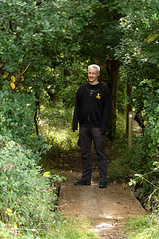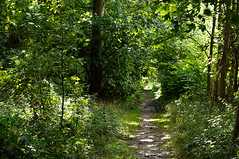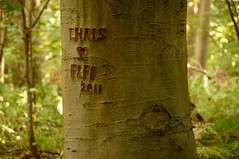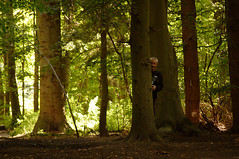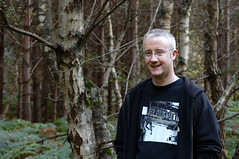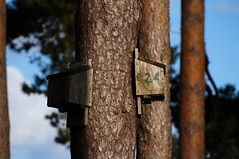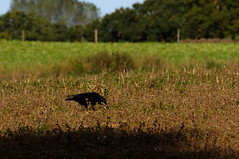We watched the third & last episode of Vikings last night. This one was split into two – firstly Oliver covered the Vikings’ exploration to the West and then in the second half he looked at how the Vikings stopped being Vikings. So the programme started off by looking at Viking ocean-going ships, and a bit of sailing & rowing in a replica, and talked about how you had to be a bit flexible in your destination given their navigational technology. And sometimes when you were heading for Shetland you might end up in Orkney, but that’s OK. And sometimes you might end up somewhere completely different – as happened when a boat blown off-course discovered Iceland. I think he was saying that Iceland was a complete accident, but after they found out there might be new lands out in the ocean they deliberately went looking for them. So they settled Greenland and even made it to the east coast of North America. The further flung colonies died off, but the Icelandic people are descended from those Viking colonisers and even some of their traditions lasted into modern times (like their government was a proto-democracy from as long ago as the Viking era). There was an amusing segment of Oliver having to eat various traditional Viking “delicacies” (in a restuarant in Iceland that has this as its theme), like “rotten shark” and various bits of a sheep one doesn’t normally eat (testicles, brains). Accompanied by descriptions from an Icelandic man who was dressed up like a Viking and very much in “torment the foreigner” mode 😉
The second half looked at how and why the Vikings stopped being what we think of as Vikings. Some of this came down to conversion to Christianity – while there’d been Christians in Denmark from fairly early on in the Viking era it wasn’t until the late 900s that Harald Bluetooth (the King of Denmark) converted and made Christianity the official religion of the kingdom. This was apparently largely for political reasons, as it made it less possible for the Holy Roman Emperor to add Denmark to his territories if that meant he was attacking a fellow Christian ruler rather than a godless heathen people. Other rulers in Scandinavia followed suit, and the differences between the old religion and the new changed the focus of the people. No longer was life all about heroic deeds and gaining enough glory so that when you died in battle you went to Valhalla. Now you should focus on living as good (and meek & mild) a life as possible to avoid eternal damnation in the hereafter.
And it finished up by looking at the re-conquest of England by Canute (grandson of Harald Bluetooth), and how his empire of most of Scandinavia and England gave him social status within Europe to a degree where the son of the Holy Roman Emperor married Canute’s daughter. I was vaguely entertained by them spelling Canute like that, as I thought we spelt it “Cnut” these days … perhaps that’s easily mis-read? 😉
A good series overall 🙂 I think it’s a shame it was done in three episodes, it made some of it feel quite shallow. In particular I think this episode could have been split into two and filled out an hour for each very easily. I’d’ve liked to hear more about the Greenland and Newfoundland colonies in the first half, and seen some of the evidence for them. And I’d’ve liked a bit more about the legacy of the Vikings in the second half – a particular thing I felt was missing was that the Normans are descended from Vikings (if I remember correctly) and this wasn’t even mentioned.
The second episode of Andrew Marr’s History of the World covered “the Age of Empires”, starting with the Assyrians and stopping just short of the Romans … which seemed an odd choice of stopping point given the title, but I guess we cover the Romans next time. As well as the Assyrians it covered the Persians, Alexander the Great, Athens & their democracy, and a very well juxtaposed series of segments on the Buddha, Confucious and Socrates. The primary theme was how this era was defined largely by war and brutal conflicts between peoples, and how this wasn’t unmitigatedly bad for society. Teachings & innovations that are still followed today grew out of people dealing with this violence.
So he looked at how both the Persians and later Alexander the Great tried to integrate their empires of disparate peoples, which could be viewed as the first attempts at a multicultural society (after the violence & slaughter that lead to the empires). Obviously the democracy of Athens was held up as the birth of the government type most in use throughout the West – but he didn’t shy away from pointing out how it wasn’t quite what we think of as democracy, and in many ways only worked because those who could vote had free time to do so because their slaves were doing the work. And Marr also highlighted the accidental nature of history here – if the Persians had conquered Athens like they tried to do then perhaps we’d have a different form of government now, at the very least it wouldn’t be called democracy. Another accident of this sort is that the Persian King Cyrus freed the Jews from their exile in Babylon, and this had a large impact on the development of Judaism. Were Cyrus not to have conquered Babylon, or not to’ve sent the Jews home, then again the world might be very different today.
The pieces about the Buddha, Confucious and Socrates looked at how these men had such different impacts on their societies but started in many ways from similar places. All were a reaction of sorts to the violent world around them. The Buddha went out from his privileged life, and sought answers to what the meaning of life was and how one should best live. He reached Enlightenment and taught and promoted a peaceful inward looking religion with no hierarchy or restrictions on who could follow it. Confucious also went out from a privileged life to walk and teach among the people, but his message was about creating a peaceful well-ordered society by conforming to the rules for appropriate behaviour. Heavy on respect and outward appearances, focused on the good of the whole people rather than the salvation of a single person. Socrates wasn’t leaving a life of privilege but he was reacting to the violent and uncertain world around him – Athens and in particular its democratic form of government felt under threat. But he didn’t react by conforming, or by retreating from the world to seek inner peace, he reacted by questioning and pushing at the boundaries of what was proper or traditional. Trying to shape a better world by never being satisfied with the easy answers. And then this lead to his death, executed as a traitor in a situation which no society since has had answers to either – if you allow free speech, at what point do the needs of the society outweigh this? What should society do when someone’s right to question runs into the society as a whole’s needs?
While I enjoyed most of the episode, and also found it thought provoking in places, there was one bit that made me roll my eyes a bit. There was a segment on the development of the alphabet, which managed to make it seem like the Phoenicians were the first (and only) people ever to connect what was written down with the sounds that were made. So it ignored completely the evidence of syllabic writing systems (like Linear B where every sign is a particular consonant+vowel combination), which can also be read back by sounding out the symbols. The difference with the alphabet as we use it is the flexibility it gives, where you can phonetically write down languages not constructed in the same way as the language the alphabet was originally designed for (this is harder to do with syllabic systems if the syllables are not the same across the languages – think about Linear B and then think of how English isn’t always consonant-vowel-consonant-vowel). I guess that segment was just very simplified, but it was almost to the point of being wrong.
The dramatic reconstructions continue to amuse me with their irreverence and melodrama. Croesus about to be burnt to death was particularly amusingly done. I’m really not normally a fan of playacting bits in history programmes, so I feel the need to mention again how entertaining they are 🙂

